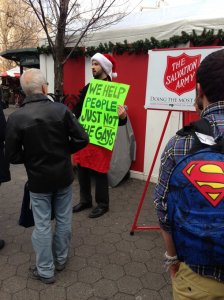As Christmas continues to approach the sound of bells fill the air outside of department and grocery stores. The red kettles recognizable as donation buckets for the Salvation Army. They are known not only for collecting donations during the holiday season, but for helping the homeless with shelter, food, clothing etc. What you may not know is that they are also known for being discriminatory towards the LGBTQ community.
I used to work for the Salvation Army at a wet, low barrier women’s shelter. What that means is 1. clients do not have to be clean and sober to receive services (the wet part), and 2. anyone who identifies as a woman may access services (low barrier part). I loved the idea of this shelter. Many shelters have program restrictions, a screening process, and a required intake process before people can access services. These are used to determine if the client is a good fit for the program. This place had none. This meant that we would get the women that no one else would take, women with severe, often untreated mental health, and women with current and ongoing substance abuse issues. Chronically homeless women were the majority of the clientele. Women who for whatever reason could not find and/or retain housing. The shelter had 50 beds which the women could access for 30 days at a time. During this time they would receive a case manager would work with them mainly on finding housing.
In theory this is a great program. Unfortunately it was poorly run by a woman who had little to no compassion for the women we served. The Salvation Army as a whole encompasses a lot of programs, all run by different people with little communication between them. They are poorly organized and push the “salvation agenda” pretty hard. I have very deep concerns about programs who help the homeless only after they have listened to a sermon, attended a Bible study, or some sort of other religious function. This is not my gospel. There should be no religious requirements attached to receiving services. I’m getting a little off track but this is one of the reasons I no longer support the Salvation Army. While the program I was a part of did not specifically require clients to attend church etc. there was a definite pressure to. This is the first problem I have; when saving someone’s soul becomes more important than providing for their basic needs. This is not a holistic approach to service and it does not serve the whole person.
Another thing I discovered while working for them is the bigotry towards the LGBTQ community. Again, in theory my program was supposed to be better in this area. We operated under a harm reduction model. An example of this would be if you know a client is using drugs you provide them with access to clean needles. Several of our clients were transwomen, or lesbians. They were welcome in the door. Unfortunately this is often were the welcome stopped. I witnessed these women being harassed by other clients and the staff did nothing about it. Sometimes my co-workers were the ones encouraging the abuse. I was told that we did not house lesbians as they may move in with their partner and this was in clean violation with the Bible. Again, this is not my gospel. And my program was tame compared to others underneath the Salvation Army umbrella.
If this is the first time you’ve heard about this I would encourage you to do some research before dropping your money into the kettle. If you are interested in doing something more tangible and forthright I recommend that you click on and print the voucher below, and drop those in the kettle instead.
Related Articles
- Don’t Donate to the Salvation Army If You Care About LGBT People
- UC Berkeley Salvation Army Controversy: Students Call For Campus Ban On Organization Citing Alleged Homophobic Practices
- Salvation Army’s Red Kettle Holiday Campaign Takes Heat From Gay Rights Activists



